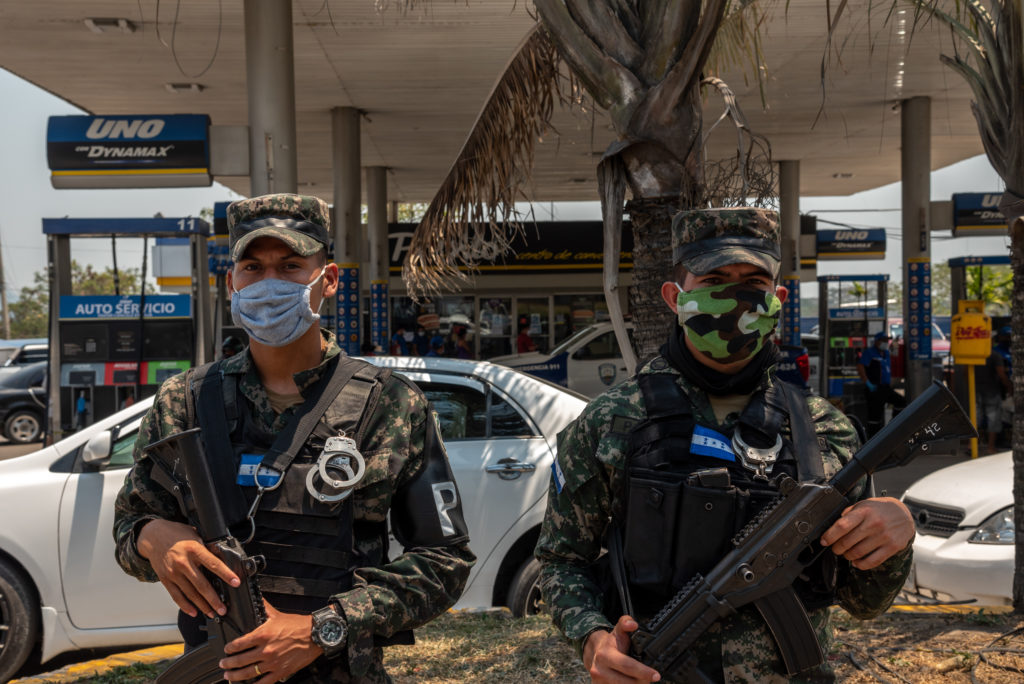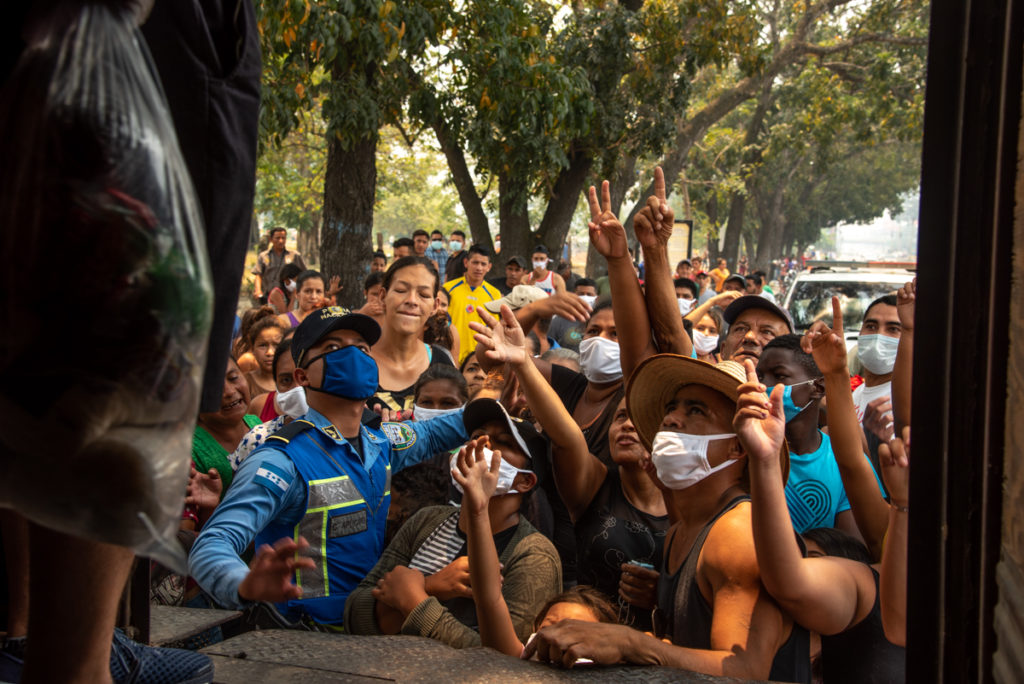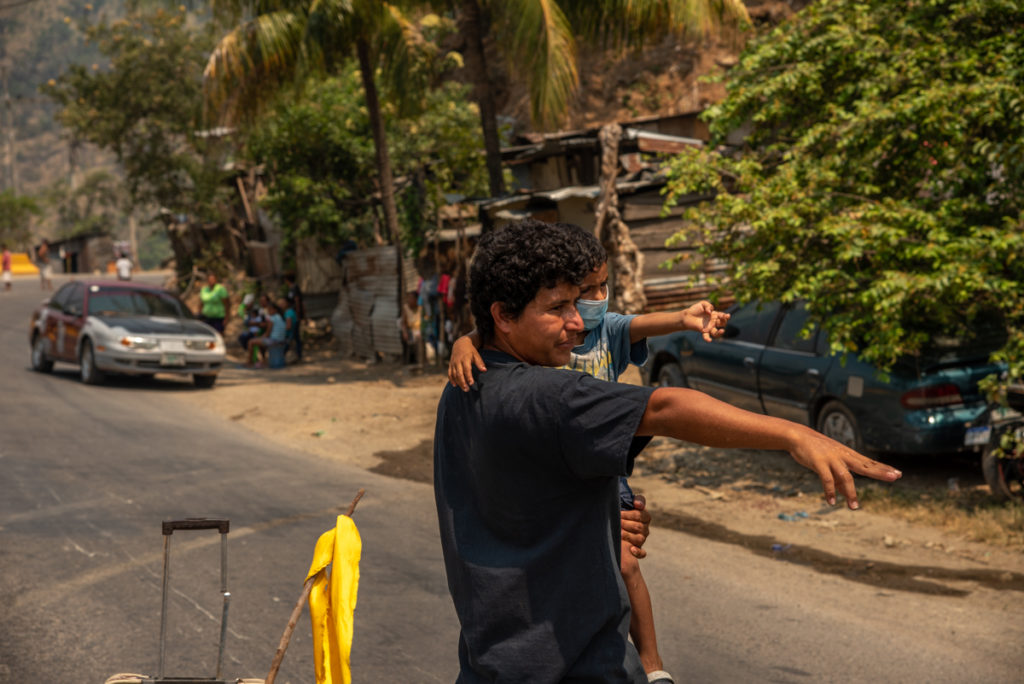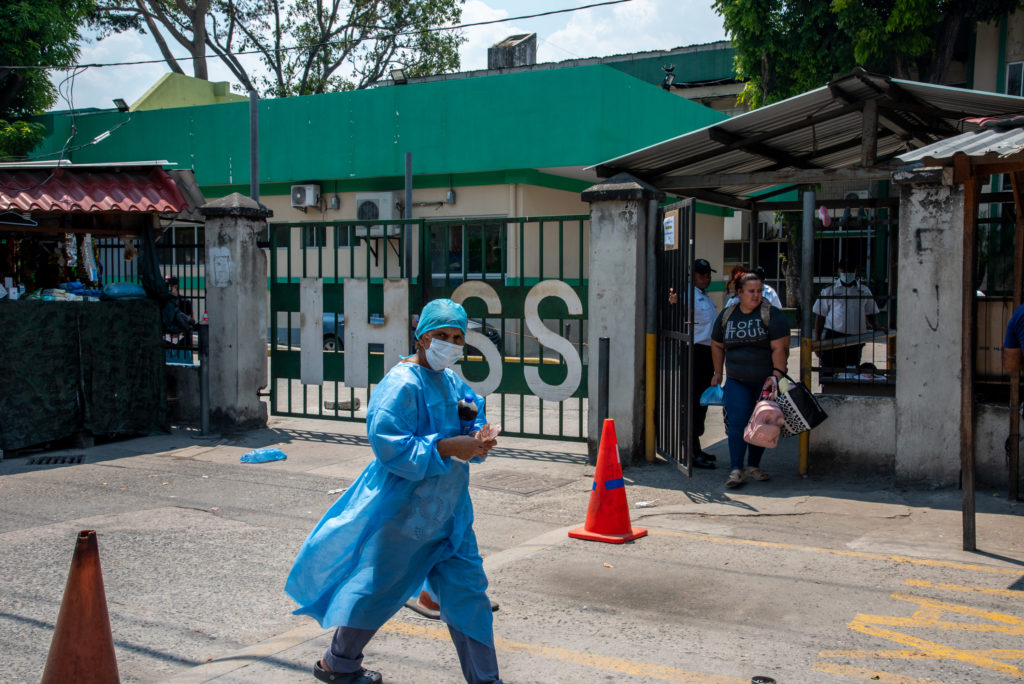Hundreds of people, many wearing medical masks, brought traffic to a standstill on an outer Tegucigalpa highway to protest the Honduran government’s response to the COVID-19 pandemic. They’re hungry, they say, demanding food and support.
Military police approach the crowd, assault rifles in hand. In a chaos of shouts, the first rounds are fired. A hail of stones thrown by the protesters come thumping and scudding on the pavement.
One of the officers levels his rifle above the protesters, firing a rapid succession of shots before jumping in the police pickup and stealing down the road. It is unclear if anyone was wounded in the confrontation.
The street battle caught on video in Tegucigalpa on May 8th shows but one face of the US-backed government of Juan Orlando Hernandez’s response to the pandemic. The government is besieged by mounting accusations of corruption and drug trafficking, and the coronavirus has ushered in a rise in hunger, corruption, state violence and repression.

In the countryside, land conflicts simmer, and many activists are worried they’ll soon boil over. Over the past decade, hundreds of peasant activists have been murdered by the Honduran military, sicarios, or state-allied paramilitary groups.
Quarantine has added a macabre new chapter to those conflicts: unable to leave their home while death threats against them continue, activists have become sitting ducks.
Clientelism, insecurity and food shortages in the cities
Even before the pandemic, the poor residents of Honduras’ largest cities had been living in an ongoing state of crisis. Half of Hondurans live in the metropolitan areas of San Pedro Sula and Tegucigalpa, many in over-policed neighborhoods rife with violent crime and with limited access to public services.
As Central America’s most unequal country, with a poverty level of 68 percent (extreme poverty floats at just above 40 percent) economic precariousness burdens the majority of residents. Sixty percent of the population of Honduras works in the informal sector, making their living day-by-day in the streets.
Food insecurity is widespread. The inability to procure regular meals is so common, that it is a root cause for many who undertake the dangerous journey north to the United States.
A 2017 World Food Program report found more than half of households in Honduras “spend more than two-thirds of their monthly income on food.” Violence is a factor in out-migration, but many also leave because they don’t have enough to eat.
But the option of emigrating north was foreclosed when, on March 15, Honduras closed all its borders due to the pandemic. Hunger became almost certain when a national stay at home order was ordered thirteen days later, rendering much of the informal sector moot.
Over a million Hondurans are now unemployed, according to a new report. The economic situation is unlikely to be improved by the looming depression in the US, where one in ten Hondurans resides. In 2018, remittances from migrants working abroad made up almost twenty percent of Honduras’ total GDP.
“It’s a cocktail of nightmares for people living in Honduras,” says Daniel Valladares Bustamante, a student activist and artist from Tegucigalpa’s working class Francisco Morazán neighborhood.
Street vendors who’ve resisted the stay-at-home order to go out and get food or money have been accosted, detained, and even killed, by military police for being on the streets.
On April 25, three brothers in Omoa, El Paraíso, who make a living selling bread on the street, had decided that, rather than starving in their homes, they would return to work.
They were targeted by the Military Police for Public Order (PMOP), a force notorious for accusations of participating in death squad-style activities in periods of anti-government protest. The officers brutally beat the brothers, shooting two of them in the melee, killing one and wounding the other.
“They had gone to work, and two military police—who had been looking for trouble in the area for days— began shooting at my older brother out of nowhere, even as he was already on the ground, they just kept shooting,” a sister of one of the brothers told local news outlet Noti Omoa.
In protest, local residents set up barricades made of burning tires in the streets of Omoa.
In another case of abuse, at noon on May 15, 34-year-old Noel Velasquez, who sells cell phone chargers and accessories on the street in Danlí, a picturesque town on the border with Nicaragua, was mistaken for a man accused of being a thief and being out street past curfew.
Velasquez was beaten and arrested by the National Police. His family has no other source of income or way to make money under quarantine, according to Mario Argeñal, a teacher from Danlí. Velasquez has since been released.
In the cities along the country’s northern littoral, and in San Pedro Sula in particular, crowds protesting food shortages and the government’s politically skewed, clientelistic aid relief program have been met with teargas and bullets.
The question on the minds of many, according to Valladares Bustamante, is the following: “Should I go out and get food for my kids—or stay in the house and watch them starve to death?”
The Central American country registered its first COVID-19 case on March 4, declaring a state of exception on March 16. A national stay-at-home order was decreed on March 28.
Under the restrictions, people can leave their homes to get food one day a week under a schedule determined by the number on their government issued ID. But in a country where over half the population lives on less than five-and-a-half dollars a day, to not go to work each day can be tantamount to death itself.
“The people who have to live day-to-day, under the stay at home orders, their suffering, I would say, has literally tripled—especially in terms of food security,” said Lenín Laínez, a congressperson for the opposition LIBRE party in a Whatsapp exchange with Toward Freedom.
“The people live day-to-day,” echoed Argeñal, the teacher from Danlí. “They’re going to keep leaving to get food each day, no matter how much teargas they shoot.”
According to Laínez and Argeñal, there have been dozens of protests and road blockades throughout Honduras in the weeks since the stay-at-home order came down. The protesters are demanding greater equity in providing food to those affected by quarantine.
In many cases, the National Police or Military Police have repressed these gatherings with teargas, with beatings, and sometimes with live ammunition.

According to a paper released on May 21 by the Committee for the Family Members of the Detained and the Disappeared (COFADEH), in April alone there’ve been no less than 11,000 arbitrary detentions of protesters, 37 protests have been violently repressed, 137 protesters have been mistreated in prison, and eight people tortured by security forces.
Beyond sending soldiers and police to repress the population, the government recently unveiled its relief package, named Honduras Solidaria.
The 355 million lempira ($14.2 million USD) program allocates funds for emergency food distribution to the local governments of the country’s 293 municipalities. The army has been enlisted to deliver bolsas solidarias— “solidarity baskets” which, according to the Presidential website, include rice, coffee, and beans—to at-risk and impoverished communities.
The government has been accused of weaponizing this program to secure support for the conservative National Party headed by Orlando Hernández, who is also known as JOH.
“Only people who belong to the National Party have been receiving help, and not the general population,” said Orlin Manuel Duarte Landero, a history professor at the National University of Honduras (UNAH).
“They’re supposed to be giving out supplies for people with few resources,” said Valladares Bustamante, who confirmed that in his neighborhood, food rations are going to National Party members. He says politicians are “using political clientelism in order to ensure votes. They’re making propaganda out of the pandemic.”
Unfortunately, clientelism isn’t just a feature of pandemic survival for the poorest in the capital.
“There is a politicization of relief,” according to Argeñal. “They constructed a mechanism of relief packages to support their party.”
In addition to teaching, Argeñal is also a TV host who runs an informational show on the local station Vida TV Danlí. He says he has received dozens of calls to his program over the last several weeks complaining of unequal distribution of resources in the El Paraíso department, skewed towards National Party affiliated communities.
According to Anabel Melgar, a student activist and member of the National Front of Youth in Resistance in the western state of Intibucá, residents receiving emergency food packets have been asked by authorities to give their ID and phone numbers, with which they’ve been then registered into the National Party.
“They’re delivering food in exchange for people to become members of the National Party,” said Melgar via Whatsapp voice message.
The National Party has been hounded by protest and widespread accusations of corruption. The most recent election, in 2017, was marked by such deep irregularities that the OAS called for a recount. Violent protests in the election’s wake saw at least 38 protesters killed—by bullets fired at protests and, in many cases, by extrajudicial executions investigators believe were carried out by state security forces.
This March, US prosecutors said President Hernández colluded with a drug trafficker to secure the 2013 election.
On April 30, a case by the US Department of Justice against notorious former Police Chief Juan “Tigre” Bonilla implicated the president in drug trafficking. Only five months before, in October 2019, a US district court indicted his brother “Tony” Hernández for using the Honduran military to import weapons and several tons of cocaine into the US through Miami.
Further reports then emerged that JOH was the beneficiary of a $1 million USD bribe from Mexican drug kingpin Joaquín “El Chapo” Guzmán.
Long a bastion of de facto US-power in Central America—hosting Soto Cano, the region’s largest military base, from which a joint rapid action task force of 500 US troops operate alongside an equal number of local soldiers—Honduras has been driven along a violent trajectory of deepening state militarization in the decade since the 2009 military coup.
This has been executed under the auspices of the so called “war on drugs” that’s served as a smokescreen for siphoning support to a regime whose security forces have repressed dissent and killed opponents to facilitate exploitation and land grabbing.
The fact that New York prosecutors implicated the President of Honduras’ immediate family in the drug trade has done little to sour his relations with the US State Department, which funneled millions in weaponry to the regime under both Obama and Trump.
“That President is working with the United States very closely,” Trump boasted of JOH at a gala for the Israeli American Council National Summit in December. “We’re stopping drugs at a level that has never happened.”
Quarantine hasn’t changed the daily violence involving the country’s two major gangs—MS-13 and Barrio 18— which in many places exist alongside and operate in symbiosis with state security forces.
Though life has changed drastically for the poor majority under quarantine, for the gangs, “there hasn’t been a change,” according to Diego Aguilar, a researcher who has worked with gangs in San Pedro Sula.
“The carrying out of blatant violence [by gangs] is still continuing within the barrios and colonias,” Aguilar said in an interview from his home in San Pedro Sula.“On the other hand, you find the daily violence of security forces in colonias, like Rivera Hernández, which are notorious for being very, very dangerous.”
On the land, embattled defenders
Honduras has had 147 known COVID-19 deaths nationwide as of May 20. The Colón Department, on the country’s northeastern coast, has according to government statistics, registered forty two infections and one death from COVID-19—a low count in comparison to the Cortés department, surrounding San Pedro Sula, which, with 141 registered deaths as of this writing, has been hardest hit by the novel coronavirus.
But early death was an intractable presence in Colón, a soaking-wet lowland of African-palm plantations. Decades-long land struggles turned nightmarish in the decade since the 2009 military coup, with a systematic campaign of killings that turned the Bajo Aguán Valley into an abattoir.
Over a hundred and fifty campesinos—waging unarmed fights to protect their rivers from mining projects, or organizing to retake stolen farmlands—have been killed by soldiers, policemen, hitmen and paramilitaries. These armed groups have, according to a substantial body of investigations, worked in collusion on behalf of transnational corporations like Dinant and Pinares Investments.
Threats against activists continue to the present day. And though the virus still only has a small foothold in the region, a strictly enforced quarantine has trapped activists in their homes as armed groups roam the valley at will. Those who continue to wage a public fight for land rights have become sitting ducks.

Farmer and activist Jaime Cabrera had already weathered his fair share of threats in his role with the Plataforma Agraria, a campesino organization in Aguán. His organization pushes for the reclamation of lands taken by the African-palm producing Dinant corporation. In 2012 one of his compañeros was murdered as part of the land conflict with Dinant. Since then, many more have been shot.
But Cabrera says the threats never seemed as serious as the one he received earlier this month, while sheltering with his family in their natural built house with a corrugated tin roof. According to Cabrera, false rumor began circulating that he and his friend were offering 30,000 lempiras ($1206 USD) for two sicarios to murder a man named Santos Torres.
Torres leads the paramilitary group “Grupo de Santos” in the community of Panamá, implicated in land conflict going back to 2010. Feared by many in the community, Torres weaponized the rumor and made the false threats real. He offered to pay double for the sicarios to murder Jaime and his friend.
“Now Santos Torres has given the order to have [my friend and I] killed within the week,” said Cabrera, choking up during our interview via WhatApp. In the background, roosters cawed slow and steady in the yard.
Unable to seek refuge elsewhere, Cabrera says he fears he could be murdered in the immediate future.
“Defenders are complying with obligatory social isolation,” said Kelsey Jost-Creegan, a staff attorney at Earth Rights. She’s seen the conflict first hand, having worked with campesino organizations in the Aguán for two years. “So they’re staying in their homes, limiting their movements. But the armed groups that are persecuting them are not complying.”
These groups—according Jost-Creegan, as well as numerous land defenders in the Aguán interviewed via WhatsApp over the course of reporting this story—are taking advantage of the quarantine to go after social leaders whose activities threaten the regional power of corporations like Dinant.
The death threat against Cabrera came after a succession of false accusations and provocations preceding the national stay-at-home order.
The Grupo de Santos reportedly stole eight of Cabrera’s pigs between January 29 and March 3—a catastrophic blow for an economically precarious subsistence farmer.
Annie Bird, a human rights researcher and director of the Guatemala Human Rights Commission who is an expert on the Aguán says the Grupo de Torres stole a motorcycle from a local family, rumored to be engaged in drug trafficking, and framed Cabrera for the theft.
Bird said the threats against Cabrera under quarantine are clearly part of a military strategy of laying the groundwork to criminalize land defenders before they are murdered, in order to drain their community support. “It’s exactly the same pattern of false, bizarre criminalization schemes.”
Yoní Rivas, of the Unified Campesino Movement of the Aguán (MUCA), is another activist who is living out quarantine under threat.
Rivas fled from the Aguán in 2016 after two of his friends, José Angel Flores and Silmer George, were assassinated by the “Grupo de Celio” paramilitary organization in broad daylight during a MUCA meeting.
After relocating to Tegucigalpa, Rivas returned to the valley on a periodic basis to continue his organizing work. He happened to be in his home village of La Confianza when the national stay-at-home order was declared.
Since quarantine started, clear messages have been conveyed to him: masked and armed members of the Grupo de Celio have been posted on guard outside his new temporary home.
Both Cabrera and Rivas are supposed to benefit from protection measures from the Honduran government, under orders from the Inter American Commission of Human Rights (IACHR) of the Organization of American States. To date, the Honduran government has failed to provide either defender with adequate protections.
This is perhaps best explained within the context of alleged links between the armed groups and the Honduran military.
According to Jost-Creegan, investigations by Earth Rights—carried out in collaboration with the Guatemalan Human Rights Commission and grassroots campesino movements—have found paramilitary groups in Panamá and La Confianza are composed of men from the communities who’ve been trained, at least in some measure, by the Honduran military.
Cabrera believes there are at least twenty members in the Grupo de Torres. According to Bird, the automatic assault rifles and bulletproof vests they use could have only been procured from the Honduran military.
Several members of the San Isidro Campesino Cooperative, a peasant group which farms collective land sought by Dinant—and which has been at the heart of the land conflict—have themselves been subject to arbitrary arrests and violent attacks since the stay-at-home order began.
The aggressions began on April 8, when Octavio Aguirre Santos, a member of the Cooperative, was hit by a truck belonging to the Dinant corporation while riding his bike.
“I didn’t see anything,” said Aguirre Santos in an interview with Toward Freedom. “I just got knocked off my bike.” He later had to go to hospital for his injuries, and is still recovering.
The offensive against the San Isidro Campesino Cooperative continued on May 2, when farmer and cooperative member Santo Rigoberto Cabrera was detained by the National Police in Tocoa. He was sent off in a police vehicle to the prison in Jutiapa, and held in solitary confinement for 24 hours.
“They captured me two blocks from my house, they took me to the police office here in Tocoa. The surprise was that it all came out of nowhere,” he says. “I wasn’t a criminal, I didn’t deserve to be arrested that way.”
On May 5th, another five members of the cooperative were apprehended by the military and national police at a checkpoint just outside of San Isidro. They were imprisoned in the Tocoa Stadium, but have since been released, according to local LIBRE party congressman Ramón ‘Moncho’ Soto.
Soto believes the arrests have resulted from genuine misunderstandings between security forces and campesinos amid the tense environment created by quarantine. But members of the cooperative believe local police, who are strongly associated with Dinant, made the arrests in order to the rattle the nerves of local activists.

Figueroa, Aguirre Santos, and Rigoberta Cabrera believe that the pandemic has served as a smokescreen to ratchet up an ongoing offensive to retake lands that campesinos have won back from Dinant since 2018.
It isn’t just the land defenders who are under attack. Eighteen water defenders from Guapinol, at the heart of the Bajo Aguán, were incarcerated on February 21, 2019 for resisting the construction of a mine adjacent to their communities that they say would poison both the Guapinol River and the Aguán River watershed.
Eight people have been killed since 2013 in the battle over the mine, and eight of the original eighteen imprisoned defenders remain in jail to this day. “They’re enduring an illegal imprisonment,” said Juan Cabrera, of the 18 Guapinol defenders. “But the COVID-19 pandemic has brought the situation to the extreme. Their family members and the committee can’t get supplies or medicine to them now.
Many activists found their continued incarceration especially outrageous considering rumors that Douglas Bustillo and Sergio Rodríguez, both accomplices in the murder of environmental activist Berta Cáceres, were slated for potential release under the pretext of health concerns in prisons due to the pandemic.
Whether in urban or rural areas, Hondurans continue to resist and organize, even under the militarized enforcement of quarantine.
“They have two sicarios set out to go after me,” says Juan Cabrera from his home in the embattled Aguán. “As defenders in Honduras, we’re continuously denounced and criminalized. So many of us get killed. In this pandemic, we’re living in especially high risk. I don’t have the resources to survive.”
Author & Photographer Bio:
Jared Olson is a writer, freelance journalist, and former Pulitzer Center grantee with a current focus on the struggle for justice in Central America.
Seth Berry is an award-winning photographer focused on documenting threats to the human condition in Central America and beyond. You can follow his work here.
